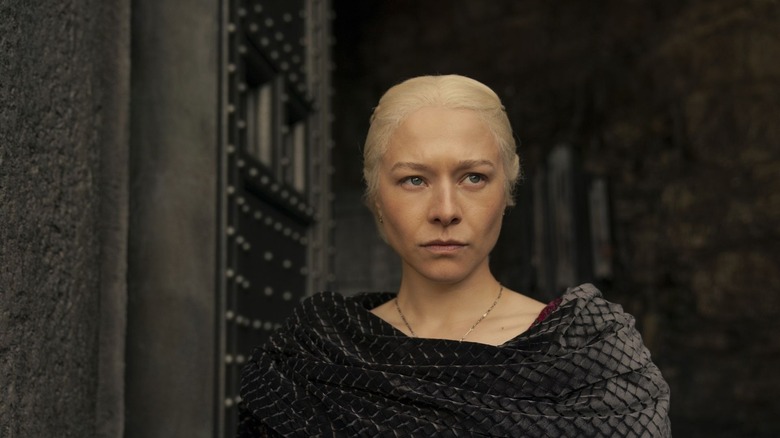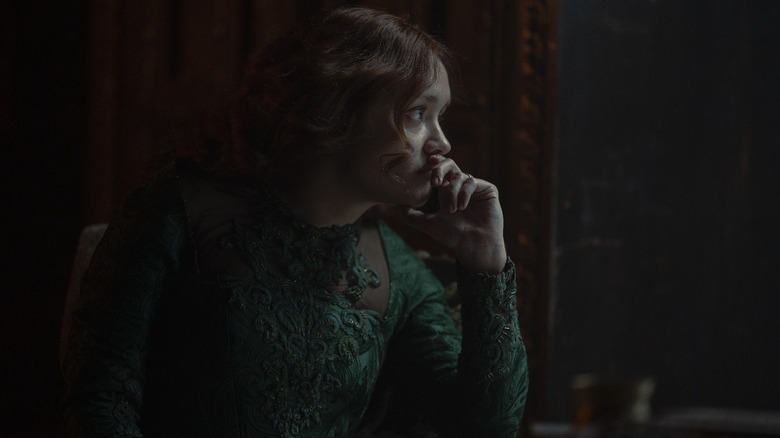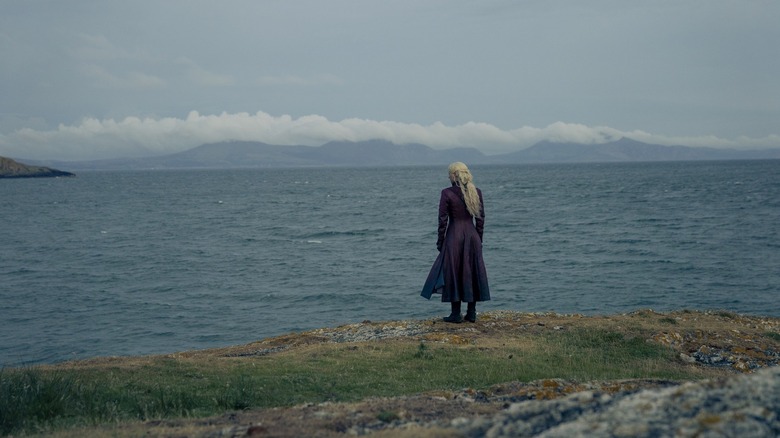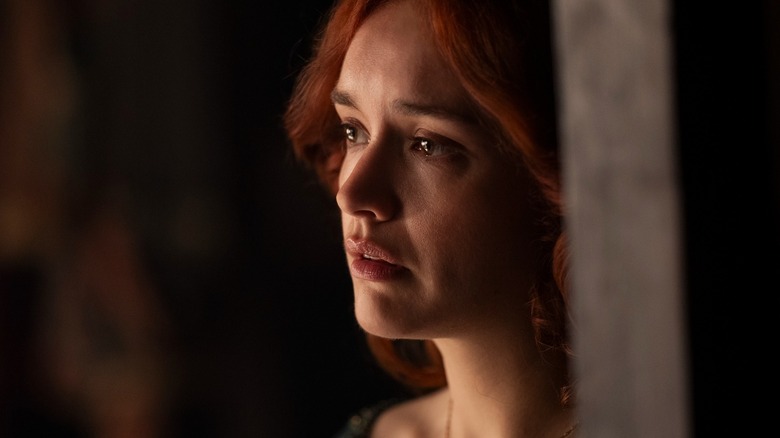Like Game Of Thrones, House Of The Dragon Season 2 Is All About How Men Hate Women
This post contains spoilers for the latest episode of "House of the Dragon."
"I don't think Westeros is particularly more anti-woman or more misogynistic than real life and what we call history," George R. R. Martin stated during a Comic-Con Panel in 2022 while explaining how "Game of Thrones" was loosely based on the War of the Roses. As fiction paves the path for mirrored social commentary and dramatic amplification of socio-political issues, misogyny and patriarchal abuse are deeply entrenched in both "Game of Thrones" and "House of the Dragon," where women have ended up getting the shorter end of the stick time and again. Episode 5 of the latest season of "House of the Dragon" drills this point home — both through repeated instances of capable women being shut down by all-male councils who secretly resent women in positions of power, and punishing women who upheld these patriarchal norms in the past to maneuver odds in their favor.
It is not controversial to state that women in Westeros who vie for power need to overcome obstacles that most men never have to. While those like Jon Snow (Kit Harington) wrestle against prejudices surrounding their "bastard" status in a fight against class/status-based discrimination, women like Daenerys Targaryen (Emilia Clarke) have to fight misogyny at every turn and are forced to resort to violence to prove their worth repeatedly. Even with the power of dragons at her side, Daenerys' journey is significantly more tumultuous, a constant tug of war to assert herself as a ruler who refuses to bow down to blatant objectification or attempts to undermine her innate strength.
Circling back to "House of the Dragon," let us look at how Rhaenyra (Emma D'Arcy) and Alicent (Olivia Cooke) feel unmoored after the flagrant undermining of their autonomy in the latest episode.
How misogynistic perceptions tint female power and autonomy in Westeros
Season 2 makes it clear that Alicent regrets putting Aegon (Tom Glynn-Carney) on the throne, and her sure-footed interpretation of Viserys' final words wobbles after an unexpected conversation with Rhaenyra. The weight of guilt crushes her even in the face of staunch denial, as the horrifying Blood & Cheese incident makes her question her role in the heartbreaking events that unfolded since her audacious declaration of war while donning the colors of the Hightower banner years back. Alicent's resentment towards Rhaenyra is surely rooted in misunderstanding, but it is also fueled by rage and unguarded jealousy, where the gap between their respective autonomies propelled her towards internalized misogyny.
A pertinent example of this is when Alicent deliberately humiliated Rhaenyra in front of the Small Council in season 1, calling attention to the fact that she was lactating after giving birth. Although a completely natural postpartum occurrence, the misogynistic framing of a room full of men viewing it as shameful, or a sign of "weakness," defines the tone of the scene where Rhaenyra is made to feel small once again. Alicent is made to feel a similar sense of shame after she drinks moon tea and is confronted by Larys (Matthew Needham). Her body, which is wracked with pain, is scrutinized by the man in an attempt to hone in on her vulnerabilities and exploit them.
Before we talk about the major Council scene where Alicent's petition to be Regent is shot down by the men surrounding her, let's hone in on how Rhaenyra's all-male Council treats her as a ruler by talking around her even when she's sitting right at the head of the table.
Rhaenyra's disenfranchisement and Mysaria's advice
After the defeat at Rook's Rest, Team Black's spirits are low, especially with the loss of Rhaenys (Eve Best). However, no man in the Council grieves the Queen Who Never Was but instead focuses on the loss of their biggest dragon while bristling in anger. No measured strategies are woven as one of them states that "the gentler sex" has never been capable of navigating war and its brutality, smugly urging Rhaenyra to stay in Dragonstone during such a dire juncture. This is a blatant reduction of her authority to that of a hollow figurehead, a queen only in title, where the respect extended to her feels insincere and begrudging.
Later, Rhaenyra confides in Mysaria (Sonoya Mizuno) how this treatment makes her feel devoid of purpose, and her inability to wield a sword boils down to Viserys' failure to back up her claim to the throne with the battle prowess that her male counterparts were unquestionably invested with. Mysaria, a woman well-versed in the need to resort to unconventional means to retain autonomy, urges her to adopt similar methods to reinforce her claim to the throne. "What you cannot do, let others do for you," she sagely advises, asking her to believe in the power of the discontented common folk, who are currently rattled by a food crisis and the ill omen of a dragon being killed in battle.
To be able to share her grief and anger with another woman who stands in solidarity is a privilege in Westeros, one that is not enjoyed by everyone who feels cornered in their own court. One can hope that Rhaenyra will finally step into a more proactive role with this advice in mind, and prove that her caution should not be mistaken for weakness.
Alicent's growing disillusionment with her place in court
After Aegon's fall creates a power vacuum, Alicent petitions to be named Regent as she already ruled King's Landing once before, but her credibility is shattered by men incapable of viewing women as firm figureheads. "But the Dowager Queen is a woman," one of them states, and defers the vote to Aemond (Ewan Mitchell), whose viciousness has recently proven to be dangerous and unpredictable. Only the Grand Maester backs up Alicent, but the others foolishly vote for Aemond, including Criston Cole (Fabien Frankel), whose misogyny runs deeper than everyone at the table.
But Alicent already knows that these men are hypocritical and power-hungry, and is aware that they will undermine women when it suits them best, as she has leveraged their prejudice to undermine Rhaenyra in the past. The taste of being treated with the same callous disrespect feels bitter, and her simmering rage overpowers the scene, which frames her mounting shame as the focal point while Aemond's war strategies fade in the background. Alicent scoffs in quiet disbelief when she hears that the Council has decided to close the gates and prevent merchants from entering or leaving: a remarkably poor decision in the face of the common folk's food crisis, doled out with the thoughtless arrogance that comes with taking one's gender-based authority for granted.
These problematic attitudes will not change anytime soon, leaving women in precarious positions to do what they can with the limited autonomy they have. Whether they choose to circumvent convention or snatch power with more direct means boils down to choice and circumstance during a time of all-out war.
New episodes of "House of the Dragon" season 2 premiere Sundays on HBO and Max.



